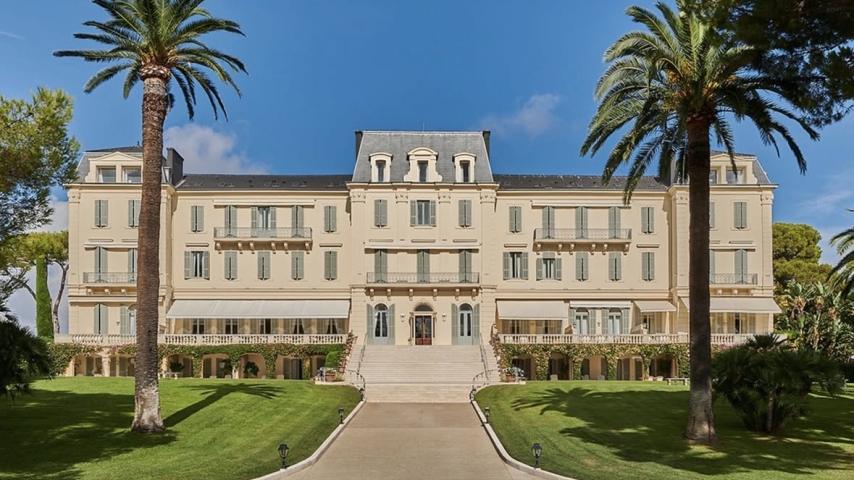
Photo credits: Hôtel du Cap‑Eden‑Roc Instagram.
In August 2025, the Hôtel du Cap‑Eden‑Roc remains one of the most historically significant and exclusive addresses on the French Riviera. Perched at the southern tip of the Cap d’Antibes peninsula, the 22-acre estate is shielded by Aleppo pines and faces the open Mediterranean. Built in 1870 as a private retreat for the founder of Le Figaro, it was converted into a hotel in 1889 and became a defining symbol of Riviera leisure in the 20th century. In 2016, the French government designated it as a “Palace”—a title held by fewer than 35 hotels nationwide.
The hotel is part of the German-owned Oetker Collection, and its architecture—largely unchanged in structure—is defined by Napoleon III-style facades, long balustraded terraces, and original ironwork. The estate consists of three main buildings: the original Château (the Hôtel du Cap), the Eden-Roc Pavilion overlooking the sea, and the adjacent Les Deux Fontaines building. In total, there are 118 rooms and suites, including several private villas and 31 standalone seaside cabanas with direct access to the shore. The villas range in size from two-bedroom garden houses to the 4,800-square-foot Villa Eleana, which comes with a private pool, security staff, and butler service (Oetker Collection).
The hotel’s most recognizable feature is its saltwater infinity pool, hewn directly into the basalt cliffs during the interwar period. The pool sits just above sea level, with a surrounding terrace equipped with private cabanas, parasols, and direct water access via ladders or diving platforms. This seafront area is accessible via a narrow staircase or elevator from the main hotel, and remains reserved exclusively for guests. The pool area includes a jetty for boat arrivals and a pontoon for swimming in the open sea (Wikipedia).
In 2023, the hotel opened Dior Spa Eden-Roc, part of Dior’s expanding luxury spa portfolio. The facility includes treatment rooms featuring Dior-designed interiors and protocols combining infrared, cryotherapy, and micro-vibration with classic massage and facial techniques. Signature services include the Dioriginel Ritual, inspired by local flora such as jasmine and cistus, and a series of lymphatic drainage treatments developed specifically for the spa. It joins a growing number of designer-branded wellness programs on the Riviera but remains one of the few operated on a seasonal schedule from April to October (Vogue).
Dining at the hotel spans several formats. The one-Michelin-starred Louroc offers Mediterranean-focused cuisine under the direction of Chef Éric Frechon, who draws from Provençal and Italian influences and incorporates produce from the hotel’s gardens. Wine service is centered on a cellar containing nearly 1,000 references, primarily French. Additional venues include Eden-Roc Grill, Giovanni’s, and terrace bars serving seafood, pastas, and seasonal fare. During the summer high season, reservations are required at all venues, even for guests (Michelin Guide).
While the hotel operates only from mid-April to mid-October, it remains a touchpoint of cultural memory. F. Scott Fitzgerald fictionalized the hotel in Tender is the Night as the Hôtel des Étrangers. In the postwar decades, it became a favorite retreat of Pablo Picasso, Elizabeth Taylor, Marc Chagall, and the Kennedy family. Some menus still bear Picasso’s original sketches. The Cannes Film Festival, just 30 minutes away, brings a surge of annual guests, but even during those weeks, the hotel enforces a strict privacy policy and limits outside bookings.
Accommodations are understated by contemporary standards. Most rooms preserve traditional layouts, decorative molding, and antique furnishings. Balconies are small but open onto uninterrupted sea or garden views. Air-conditioning, satellite television, and Wi-Fi are available, but intentionally discreet. Room service operates 24/7 but with limitations during off-peak hours, reflecting the hotel’s focus on on-site dining. The children's club, tennis courts, fitness center, and spa programming operate at full scale only in high summer—typically from June through August.
As of August 2025, the Hôtel du Cap‑Eden‑Roc holds its position not by trend or expansion, but by consistency. There are no nightclubs or event spaces, no brand partnerships beyond Dior, and no plans for redevelopment. Instead, the value of the property lies in its enduring infrastructure: 19th-century architecture, rigorous maintenance, and a model of privacy where no signage identifies the hotel from the road.
The hotel closes again in mid-October and will reopen for its 156th season in April 2026.

